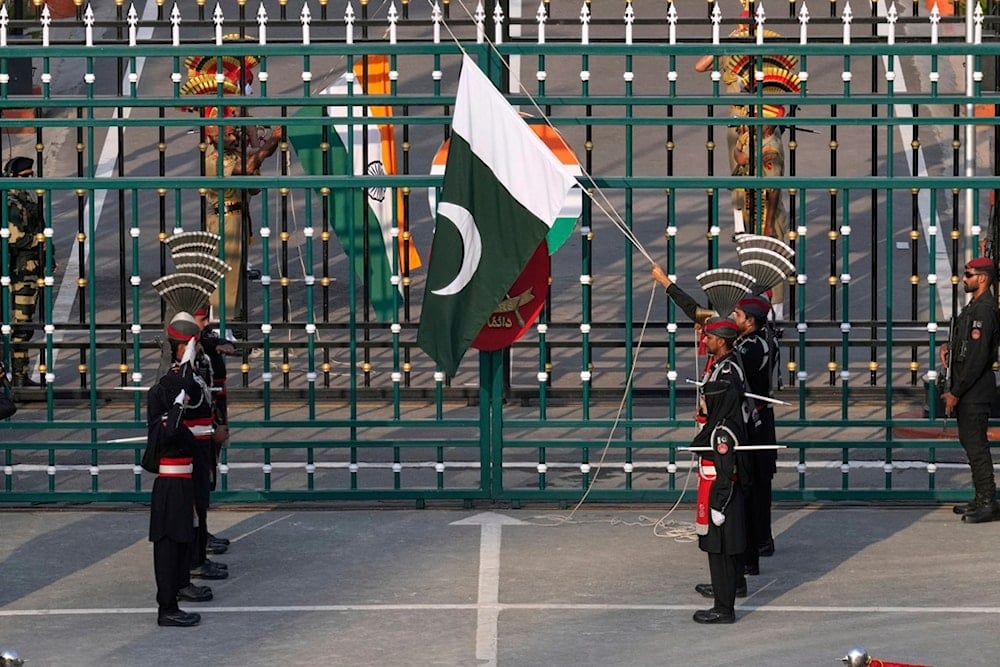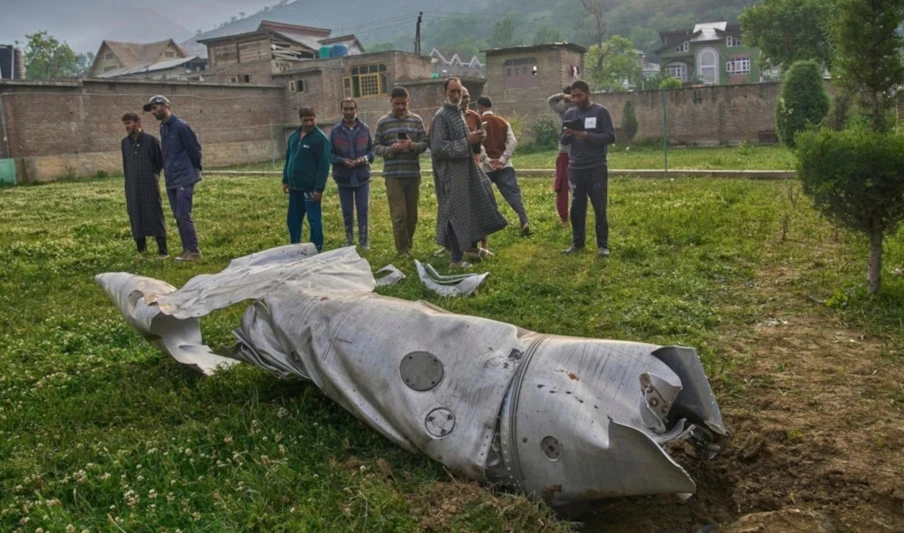Timeline of India-Pakistan conflicts: 1947 partition - 2025's Pahalgam
Explore the decades-long India-Pakistan conflict over Kashmir, from partition in 1947 to India's 2025 Operation Sindoor and the latest military escalation.
 Pakistan's Rangers soldiers, in black, and Indian Border Security Forces soldiers, behind the gate, lower their flags during a daily closing ceremony at the Wagah, a joint post on the Pakistan and India border, near Lahore, Pakistan, Monday, May 5, 2025 (AP)
Pakistan's Rangers soldiers, in black, and Indian Border Security Forces soldiers, behind the gate, lower their flags during a daily closing ceremony at the Wagah, a joint post on the Pakistan and India border, near Lahore, Pakistan, Monday, May 5, 2025 (AP)
After tensions between India and Pakistan escalated in recent weeks, India launched a military operation dubbed Sindoor, which included strikes on several sites inside Pakistan.
Islamabad, in turn, vowed to respond and announced it had downed five Indian aircraft before they entered its airspace. It added that the Indian attack resulted in the killing of 26 civilians and the injury of 46 others.
This development comes two weeks after an attack that was carried out by gunmen in the Indian region of Pahalgam killed 26 people. Pakistan denied Indian claims of being behind the attack. Meanwhile, as of yet, no group has claimed responsibility for the attack, which took place in a region that has witnessed an armed insurgency since 1989 by groups seeking either independence or accession to Pakistan, a country that shares control of Kashmir with India.
Timeline of key India-Pakistan conflicts
1947: Partition, First Kashmir War
In 1947, Britain partitioned its former colony into two countries: Pakistan, with a Muslim majority, and India, which retained its name and has a Hindu majority.
The fate of Kashmir remained undecided, and both India and Pakistan claimed the territory within months, marking the beginning of the dispute as soon as the two states were created.
A military confrontation broke out after tribal groups from Pakistan entered parts of Kashmir. The Hindu ruler of the region agreed to accede to India in exchange for security guarantees, after initially refusing to surrender sovereignty.
This marked the beginning of the first war between India and Pakistan over Kashmir.
1949: UN ceasefire
The first India-Pakistan war over Kashmir ended in January 1949 following a United Nations intervention that led to a ceasefire agreement.
A line was drawn to divide the region, granting India control of about two-thirds of Kashmir, while Pakistan controlled the remaining third.
This line was intended to be temporary pending a more permanent political resolution.
1965: Second India-Pakistan War
Skirmishes erupted between Indian and Pakistani forces along the southern border of Kashmir in 1965. Tensions escalated over the summer.
In August, Pakistan launched a covert operation across the ceasefire line in Kashmir, and the fighting quickly escalated into a full-scale war.
Though the conflict lasted only about three weeks, it was bloody. In January 1966, the two sides signed an agreement to resolve future disputes through peaceful means.
1972: Simla Agreement
After a regional war in 1971 that resulted in the creation of Bangladesh, India and Pakistan decided to revisit the Kashmir issue.
In December 1972, both nations signed the Simla Agreement and announced that they had resolved the standoff over the Kashmir ceasefire line. However, little changed beyond the terminology.
The 1949 ceasefire line was formally renamed the “Line of Control,” and both countries retained the portions of Kashmir they had controlled for over 20 years.
Although the agreement did not alter the status of Kashmir, it was accompanied by aspirations to improve the fragile relationship between the two countries.
1987: Rise of armed insurgency
In 1987, amid a period of exceptional political unrest, exacerbated by disputes over local elections widely seen as rigged, some Kashmiris turned to militancy, encouraged and supported by Pakistan.
Over the following decade, the Kashmir police recorded tens of thousands of bombings, shootings, kidnappings, and rocket attacks.
While violence began to decline in the early 2000s, years of intense insurgency further eroded the already tenuous relationship between India and Pakistan.
1999: Positions seized in Indian-administered Kashmir
As the new millennium approached, India and Pakistan appeared to be on the brink of establishing a more lasting peace.
In February 1999, Pakistani Prime Minister Nawaz Sharif hosted his Indian counterpart, Atal Bihari Vajpayee, for a weekend summit.
The meeting between the two nuclear-armed rivals resulted in signed declarations pledging mutual commitment to normalizing relations.
However, three months later, war broke out again, once more over Kashmir.
Fighting began after Pakistani infiltrators seized positions in the Indian-administered part of Kashmir. India claimed the infiltrators were Pakistani soldiers, while Pakistan denied this, insisting the attackers were independent militants.
The war ended when Sharif called on the infiltrators to withdraw. Months later, Sharif was ousted in a military coup by a Pakistani general who was later revealed to have orchestrated the infiltration that sparked the conflict.
2019: India strips Kashmir of its special status
Following the 1999 war, Kashmir remained one of the most heavily militarized zones in the world. Continual unrest in the region brought India and Pakistan to the brink of war several times in the years that followed.
The last major flare-up occurred in 2019 when a bombing in Kashmir killed at least 40 Indian soldiers. In retaliation, Indian warplanes carried out airstrikes inside Pakistan. Tensions later subsided before escalating into full-scale war.
Later that year, in a more enduring move, India stripped Kashmir of its semi-autonomous status.
Historically, since its accession to India by its Hindu ruler, Kashmir had enjoyed a degree of autonomy, enshrined in the Indian Constitution.
But in August 2019, Indian Prime Minister Narendra Modi revoked this special status.
India launched a harsh crackdown, deploying thousands of troops into the region. Internet and phone lines were cut, and the Modi government began administering Kashmir directly from New Delhi, imprisoning thousands of Kashmiris, including political leaders long aligned with India against separatist militancy.
2025: Pahalgam attack, Operation Sindoor
Fast forward to 2025, on April 22, gunmen opened fire near Pahalgam in Kashmir, killing 26 people, most of them tourists from various parts of India, and injuring 17 others. The attack was among the deadliest against Indian civilians in decades.
Afterward, Indian officials hinted at Pakistani involvement. Prime Minister Modi vowed a harsh punishment for the perpetrators and those providing safe haven for them, without naming Pakistan directly.
Islamabad swiftly denied involvement and said it was ready to cooperate with any international investigation into the attack.
On Wednesday, India launched strikes with ballistic missiles on nine targets in Pakistan and on the Pakistani side of Kashmir, saying its intelligence monitoring indicated that “further attacks against India were impending."
Pakistan described the attacks as “a blatant act of war," with Defense Minister Khawaja Muhammad Asif emphasizing that Islamabad “won’t take long to settle the score.”
Read more: India-Pakistan escalation: Water flow cut, strikes kill dozens

 6 Min Read
6 Min Read










